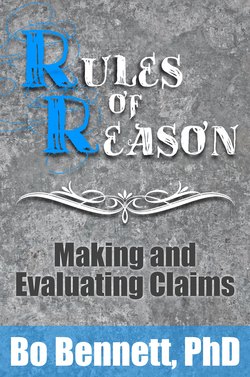Читать книгу Rules of Reason - Bo Bennett PhD - Страница 3
На сайте Литреса книга снята с продажи.
Preface
ОглавлениеBack in 2012, after several years of being immersed in online debate for far more hours a day than I am proud to admit, I wrote the book, Logically Fallacious, which is like an encyclopedia of logical fallacies that identifies hundreds of common errors in reasoning. Since that time, I have been running the website of the same name where I help people from around the world parse arguments and identify if the arguments contain fallacies or not. What became clear is that identifying errors in reasoning will only get us so far to mastering reason. What is needed to get us all the way there are some rules to doing it right or rules of reason.
These rules of reason are unlike the immutable laws of logic. Laws reflect the way things are, whereas rules are more like guidelines that, when followed, consistently produce the most favorable outcome. Rules can be bent, and some even broken, especially in extenuating circumstances.
Think of these rules of reason like nutrition guidelines. Although nutrition guidelines are continually changing based on new information, the changes are relatively minor. It is highly unlikely that it will one day be discovered that we should be consuming twice as many calories or that fresh vegetables are bad for us, and we should be eating more Twinkies. We follow the general guidelines and make tweaks that work with our particular circumstances. Likewise, the rules of reason are the general guidelines to which tweaks can be made based on the particular circumstances.
This book contains the rules of reason for making and evaluating claims, which I believe to be an area where reason is most needed. Keep in mind that not all rules apply to all claims; some rules address certain kinds of claims, such as claims of causality and analogies. Properly and reasonably evaluating claims can have a dramatic impact on both your personal and professional life. Appealing to a higher cause, that cause being the stability of a democratic society, you can see it as your civic duty to do what you can to be an informed and responsible citizen. Knowing how to reason through claims should be knowledge taught in grade school.
Our goal in this book is to evaluate the strength of claims, including the ones that we make. We won’t be going as far as to accept or reject claims, as that requires a deep understanding of evaluating evidence. But without a strong, clear, and well-presented claim, the evaluation of evidence can be a waste of time and even lead us to poor conclusions.
For evaluation purposes, we base the strength of a claim on how clear and precise it is, not how true it might be. The strength of a claim should not be confused with the strength of an argument, which includes one or more reasons for the claim. The claim “a living unicorn (i.e., the horse-like creature with a single horn from its head) is currently in my bedroom” is a strong claim despite the fact that it is almost certainly untrue.
In this book, we will be looking at eleven rules for making and evaluating claims, and going through many examples along the way. By the time you have finished this should book, no matter how good you were before at evaluating claims, I guarantee1 that you will be even better at it.
